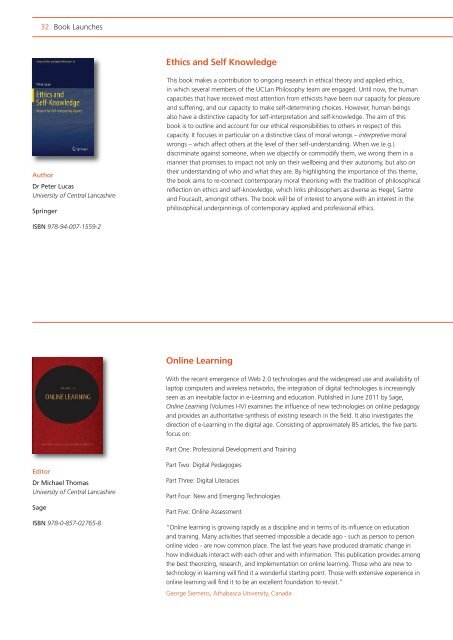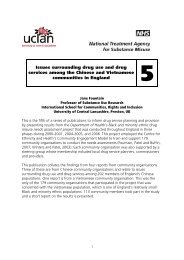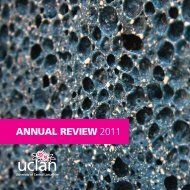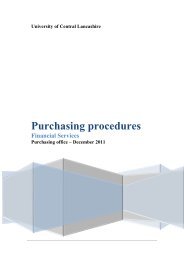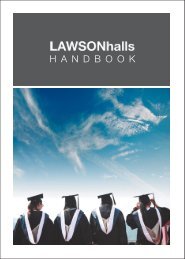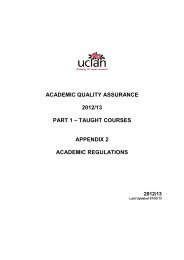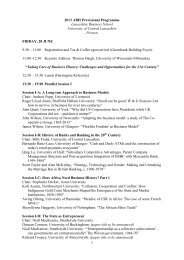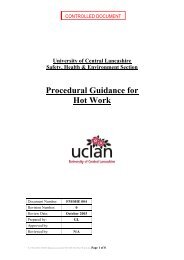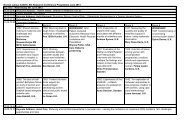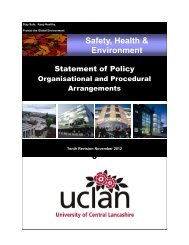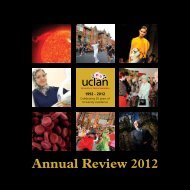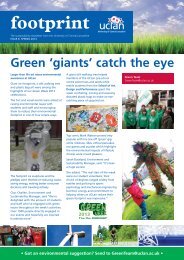Autumn 2011 Issue - University of Central Lancashire
Autumn 2011 Issue - University of Central Lancashire
Autumn 2011 Issue - University of Central Lancashire
Create successful ePaper yourself
Turn your PDF publications into a flip-book with our unique Google optimized e-Paper software.
32 Book Launches<br />
Ethics and Self Knowledge<br />
Author<br />
Dr Peter Lucas<br />
<strong>University</strong> <strong>of</strong> <strong>Central</strong> <strong>Lancashire</strong><br />
Springer<br />
This book makes a contribution to ongoing research in ethical theory and applied ethics,<br />
in which several members <strong>of</strong> the UCLan Philosophy team are engaged. Until now, the human<br />
capacities that have received most attention from ethicists have been our capacity for pleasure<br />
and suffering, and our capacity to make self-determining choices. However, human beings<br />
also have a distinctive capacity for self-interpretation and self-knowledge. The aim <strong>of</strong> this<br />
book is to outline and account for our ethical responsibilities to others in respect <strong>of</strong> this<br />
capacity. It focuses in particular on a distinctive class <strong>of</strong> moral wrongs – interpretive moral<br />
wrongs – which affect others at the level <strong>of</strong> their self-understanding. When we (e.g.)<br />
discriminate against someone, when we objectify or commodify them, we wrong them in a<br />
manner that promises to impact not only on their wellbeing and their autonomy, but also on<br />
their understanding <strong>of</strong> who and what they are. By highlighting the importance <strong>of</strong> this theme,<br />
the book aims to re-connect contemporary moral theorising with the tradition <strong>of</strong> philosophical<br />
reflection on ethics and self-knowledge, which links philosophers as diverse as Hegel, Sartre<br />
and Foucault, amongst others. The book will be <strong>of</strong> interest to anyone with an interest in the<br />
philosophical underpinnings <strong>of</strong> contemporary applied and pr<strong>of</strong>essional ethics.<br />
ISBN 978-94-007-1559-2<br />
Online Learning<br />
With the recent emergence <strong>of</strong> Web 2.0 technologies and the widespread use and availability <strong>of</strong><br />
laptop computers and wireless networks, the integration <strong>of</strong> digital technologies is increasingly<br />
seen as an inevitable factor in e-Learning and education. Published in June <strong>2011</strong> by Sage,<br />
Online Learning (Volumes I-IV) examines the influence <strong>of</strong> new technologies on online pedagogy<br />
and provides an authoritative synthesis <strong>of</strong> existing research in the field. It also investigates the<br />
direction <strong>of</strong> e-Learning in the digital age. Consisting <strong>of</strong> approximately 85 articles, the five parts<br />
focus on:<br />
Part One: Pr<strong>of</strong>essional Development and Training<br />
Editor<br />
Dr Michael Thomas<br />
<strong>University</strong> <strong>of</strong> <strong>Central</strong> <strong>Lancashire</strong><br />
Sage<br />
ISBN 978-0-857-02765-8<br />
Part Two: Digital Pedagogies<br />
Part Three: Digital Literacies<br />
Part Four: New and Emerging Technologies<br />
Part Five: Online Assessment<br />
“Online learning is growing rapidly as a discipline and in terms <strong>of</strong> its influence on education<br />
and training. Many activities that seemed impossible a decade ago - such as person to person<br />
online video - are now common place. The last five years have produced dramatic change in<br />
how individuals interact with each other and with information. This publication provides among<br />
the best theorizing, research, and implementation on online learning. Those who are new to<br />
technology in learning will find it a wonderful starting point. Those with extensive experience in<br />
online learning will find it to be an excellent foundation to revisit.”<br />
George Siemens, Athabasca <strong>University</strong>, Canada


